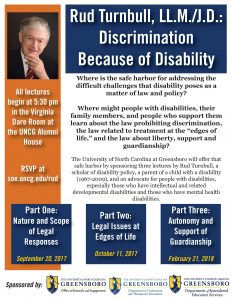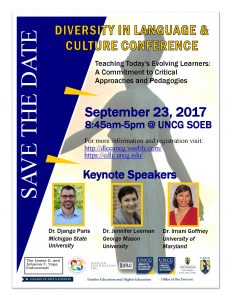ANNOUNCEMENTS
National Folk Festival 2017 – Collaborative Storytelling and Color-by-Number Projects
Check out the SELF Design Studio’s recap of their weekend at the Folk Festival along with links to collaborative stories! https://beta-soe.uncg.edu/services/self-design-studio/news/
ERM students to continue offering free consulting services
Graduate students from the Educational Research Methodology (ERM) Department offer free consulting services to graduate students, faculty, and staff at UNCG.
Areas of consulting include:
- Quantitative Methodology
- Intermediate Statistics (ANOVA, ANCOVA, Repeated Measures, etc.) & Multivariate Statistics
- Classical Test Theory (CTT) & Item Response Theory (IRT)
- Multiple Regression & Hierarchical Linear Modeling (HLM)
- Factor Analysis & Structural Equation Modeling (SEM)
- Diagnostic Classification Modeling (DCM)
- Survey Design and Analysis
- Statistical Computing (R, SAS, SPSS, etc.)
- Program Evaluation Methodology
- Culturally Responsive Research & Evaluation Methodology
- STEM Education Research & Evaluation Methodology
- Collaborative/Participatory Research & Evaluation Methodology
- Qualitative Research & Evaluation Methodology
- Mixed Methods Research & Evaluation Methodology
- Additional Specific methods include: Research/Evaluation Design, Data Collection (Surveys, Interviews, Focus Groups, Data Analysis & Reporting), & Literature Review
To request an appointment, please fill out the form:
https://docs.google.com/forms/d/1M1mONt6qwxjYCnqKBxHpIC5J4tRoxZekSA0ktbfl6sw/edit
Curriculum Corner
The SOE Curriculum Committee would like to update you on our deadlines for the 2017-2018 year.Deadline to Submit Forms to SOE Curriculum Committee
September 5 (Spring/Summer 2018 Deadline)
September 26
October 31
November 28
January 16 (Fall 2018 Bulletin Deadline)
February 20
March 20
April 17
September 5 (Spring/Summer 2018 Deadline)
September 26
October 31
November 28
January 16 (Fall 2018 Bulletin Deadline)
February 20
March 20
April 17
Please note: Submissions for curricular changes to the SOE Committee for Spring/Summer 2018 must be received by September 5th, and must be approved by our September 12th meeting. Please submit all forms to Scott Howerton: wshowert@uncg.edu. If you have any questions about curricular items, please feel free to contact your SOE Curriculum Committee representative.
Many thanks from the Committee,
Anne Akers (LIS)
Jill Chouinard (ERM)
Brian Clarida (ELC)
Scott Howerton (TEHE, Co-Chair, UCC Rep.)
Teresa Little (SES, Co-Chair)
Keith Mobley (CED)
Jewell Cooper (ex-officio, GSC Rep.)
Anne Akers (LIS)
Jill Chouinard (ERM)
Brian Clarida (ELC)
Scott Howerton (TEHE, Co-Chair, UCC Rep.)
Teresa Little (SES, Co-Chair)
Keith Mobley (CED)
Jewell Cooper (ex-officio, GSC Rep.)
Helpful Links:UNCG Curriculum Guide (use this link to access CURRENT forms and to learn about curriculum procedures)Curriculum Help Workshops Not sure how to complete your form(s)? There’s help…Please Sign-Up!
UPCOMING EVENTS
Rud Turnbull Lecture Series

Diversity in Language & Culture Conference

SOE Magazine Launch Celebration

FACULTY ACCOMPLISHMENTS
Congratulations to Dr. Devdass Sunnassee on his awards from North Carolina Bar Association (NCBA) for his projects “NC Bar Contract for Paralegal Exams (2017-2018)” and “NC Bar Contract for Specialty Exams (2017-2018).”
The September 2017 issue of Counselor Education and Supervision [56(3)] includes some informative studies from CED-affiliated authors:
Laura Welfare (alum, counselor educator at Virginia Tech) and her coauthors present results of a study of the implications of Title IX for counselor educators and their awareness of those implications around requirements to report student disclosures – including disclosures by both master’s students and undergraduate volunteer clients – about gender-based discrimination, including sexual assault, sexual harassment, trauma in general, and hazing. Check out “Counselor Education and Title IX: Current Perceptions and Questions” (pp. 193-207).
Drs. Borders, Cashwell, Welfare, and a coauthor report the results of a CQR study about doctoral supervisors’ experiences providing constructive feedback and confrontation in their interactions with their master’s student supervisees during their clinical supervision internship. Even experienced supervisors find providing such feedback awkward and uncomfortable; what did new supervisors report? Check out “New Supervisors’ Struggles and Successes with Corrective Feedback” (pp. 208-224).